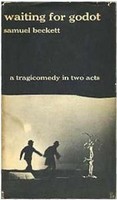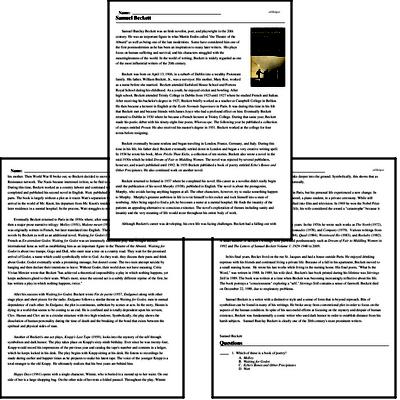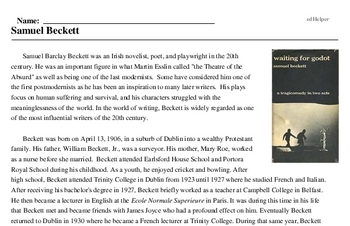Samuel Beckett
Samuel Barclay Beckett was an Irish novelist, poet, and playwright in the 20th century. He was an important figure in what Martin Esslin called "the Theatre of the Absurd" as well as being one of the last modernists. Some have considered him one of the first postmodernists as he has been an inspiration to many later writers. His plays focus on human suffering and survival, and his characters struggled with the meaninglessness of the world. In the world of writing, Beckett is widely regarded as one of the most influential writers of the 20th century.
Beckett was born on April 13, 1906, in a suburb of Dublin into a wealthy Protestant family. His father, William Beckett, Jr., was a surveyor. His mother, Mary Roe, worked as a nurse before she married. Beckett attended Earlsford House School and Portora Royal School during his childhood. As a youth, he enjoyed cricket and bowling. After high school, Beckett attended Trinity College in Dublin from 1923 until 1927 where he studied French and Italian. After receiving his bachelor's degree in 1927, Beckett briefly worked as a teacher at Campbell College in Belfast. He then became a lecturer in English at the Ecole Normale Superieure in Paris. It was during this time in his life that Beckett met and became friends with James Joyce who had a profound effect on him. Eventually Beckett returned to Dublin in 1930 where he became a French lecturer at Trinity College. During that same year, Beckett made his poetic debut with his ninety-eight-line poem, Whoroscope. The following year he published a collection of essays entitled Proust. He also received his master's degree in 1931. Beckett worked at the college for four terms before resigning.
Beckett eventually became restless and began traveling in London, France, Germany, and Italy. During this time in his life, his father died. Beckett eventually settled down in London and began a very creative writing spell. In 1934 he wrote his book, More Pricks Than Kicks, a collection of ten stories. Beckett also wrote a novel in the mid-1930s which he titled Dream of Fair to Middling Women. The novel was rejected by several publishers, however, and wasn't published until 1992. In 1935 Beckett published a book of poetry entitled Echo's Bones and Other Precipitates. He also continued work on another novel.
Beckett returned to Ireland in 1937 where he completed his novel. His career as a novelist didn't really begin until the publication of his novel Murphy (1938), published in English. The novel is about the protagonist, Murphy, who avoids having anything happen at all. The other characters, however, try to make something happen to Murphy. Murphy's greatest ambition in life is to tie himself to his rocker and rock himself into a state of nonbeing. After being urged to find a job, he becomes a nurse at a mental hospital. He finds the insanity of the patients an appealing alternative to conscious existence. The novel's exploration of themes including sanity and insanity and the very meaning of life would recur throughout his entire body of work.




